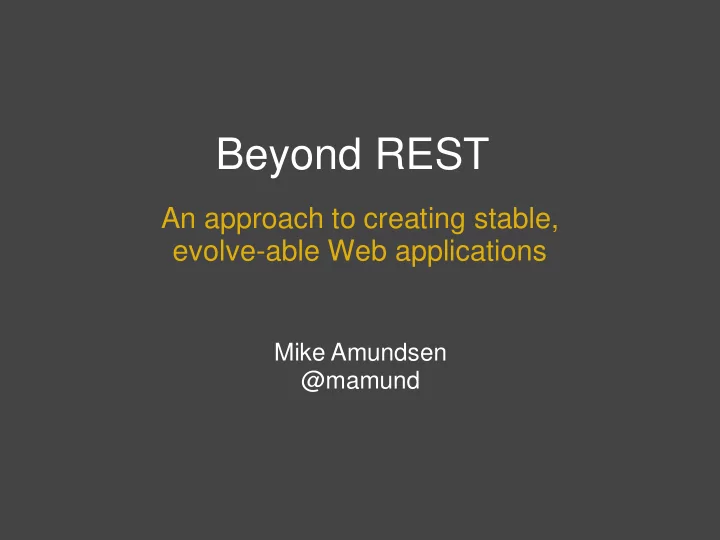

Beyond REST An approach to creating stable, evolve-able Web applications Mike Amundsen @mamund
Preamble • Mike Amundsen • Developer, Architect, Presenter • Hypermedia Junkie • “I program the Internet.” • Designing Hypermedia APIs with Node and HTML5 Fall 2011
Preamble • Beyond REST • Not “Better than” REST • Not “After” REST • Just “Beyond” REST
Overview • The Question
Overview • The Question • A Few Observations
Overview • The Question • A Few Observations • One Approach
Overview • The Question • A Few Observations • One Approach • Some Techniques
The Question
The question is...
The question is... How can we design
The question is... How can we design and implement
The question is... How can we design and implement distributed network solutions that remain
The question is... How can we design and implement distributed network solutions that remain stable
The question is... How can we design and implement distributed network solutions that remain stable and flexible
The question is... How can we design and implement distributed network solutions that remain stable and flexible over time?
The question is... How can we design and implement distributed network solutions that remain stable and flexible over time?
The question is... How can we design and implement distributed network solutions that remain stable and flexible over time? Evolvable systems.
The question is... How can we design and implement distributed network solutions that remain stable and flexible over time? Evolvable systems.
A Few Observations
Definitions
Definitions • Stability
Definitions • Stability o "the strength to stand or endure" - Webster
Stability
Stability
Definitions • Stability o "the strength to stand or endure" - Webster
Definitions • Stability o "the strength to stand or endure" - Webster • Flexibility
Definitions • Stability o "the strength to stand or endure" - Webster • Flexibility o "characterized by a ready capability to adapt to new, different, or changing requirements." - Webster
Flexibility
Flexibility
Definitions • Stability o "the strength to stand or endure" - Webster • Flexibility o "characterized by a ready capability to adapt to new, different, or changing requirements." - Webster
Definitions • Stability o "the strength to stand or endure" - Webster • Flexibility o "characterized by a ready capability to adapt to new, different, or changing requirements." - Webster • Time
Definitions • Stability o "the strength to stand or endure" - Webster • Flexibility o "characterized by a ready capability to adapt to new, different, or changing requirements." - Webster • Time o "a nonspatial continuum that is measured in terms of events which succeed one another from past through present to future." - Webster
Time
Time
Time
On the scale of years “Most of REST's constraints are focused on preserving independent evolvability over time, which is only measurable on the scale of years. Roy Fielding, August 2010
Another way to see it...
Flexible
Stable AND Flexible
Stable AND Flexible Over Time
Alive … Stable “In short, saying these [patterns] are alive is more or less the same as saying they are stable.” Christopher Alexander, 1979
One Approach
A Model
A Model “Design depends largely on constraints” Charles Eames, 1972
A Model Protocol Semantics
A Model • The transfer protocol • HTTP, FTP, etc. • Standardized (RFCs, etc.) • Slowest changing • Shared by all participants Protocol • Use “as - is” Semantics • The stable foundation
A Model State Protocol Handling Semantics
A Model State Protocol Handling Semantics
A Model • Identification • Sharing • Storage • Transient • Unique for each participant State • Handling Create/Manipulate as Needed • Identify & share via message • Media type • Headers • Store locally
A Model State Protocol Handling Semantics
A Model Protocol Domain State Semantics Semantics Handling
A Model Protocol Domain State Semantics Semantics Handling
A Model • Application-level semantics • Discover • Encapsulate • Describe • Shared Understanding Domain • For acknowledged participants Semantics • Evolvable over time • Message-Enabled • Media type • Semantic Profile, etc
A Model Connector Data Component Protocol Domain State Semantics Semantics Handling
Some Techniques
Connector | Protocol Techniques • Embrace HTTP as the “network interface” • Methods • Response Codes • Headers • Media types
This NOT an HTTP Interface
HTTP Is NOT The Interface
HTTP Is The Interface
Connector | Protocol Techniques • Reduce HTTP Impedance Mismatch • Use frameworks that “talk” HTTP • Avoid libraries that hide HTTP
Reduce HTTP Impedance Mismatch
Component | State Techniques • Honor State Boundaries • Publicly state-less • privately state-ful
State Boundaries
Component | State Techniques • Avoid Session Tracking • All you need to share is “who”
All you need to share is “who”
Component | State Techniques • Avoid State “Design” Leaking • State belongs to components, not connectors
Avoid Leaking State Design
Data | Domain Techniques • Avoid Type Marshalling|Object Serialization
Data | Domain Techniques • Avoid Type Marshalling|Object Serialization • Use Templating Instead
Data | Domain Techniques • Use MVC Wisely • “Fat” M (not just DB serialization) • “Loose” V (templates, not codecs) • “Decoupled” C (SoC for addressing)
Data | Domain Techniques • Maximize Hypermedia • State Transfer • Domain Style • App Flow
Data | Domain Techniques • Model w/ Media Types • Document Media Type, not interactions • Replace RPC designs w/ Media Type designs
Model with Media Types
Summary
Summary • How can we make implementations more flexible and stable over time? • Make time your ally • Design “living” systems • Embrace Connector+Component+Data Model • Adopt techniques that • Embrace the protocol • Play to strengths in each design element (CCD) • Recognize clear boundaries
Design … Discipline “Design without discipline is anarchy, an exercise of irresponsibility” Massimo Vignelli, 2010
Beyond REST An approach to creating stable, evolve-able Web applications Mike Amundsen @mamund
Recommend
More recommend